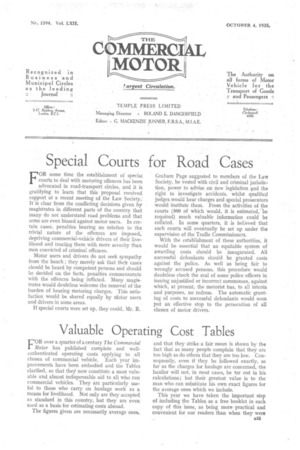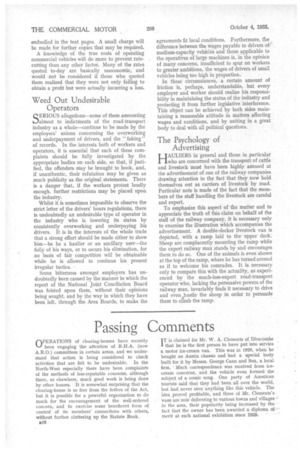Valuable Operating Cost Tables
Page 29

Page 30

If you've noticed an error in this article please click here to report it so we can fix it.
FOR over a quarter of a century The Commercial Motor has published complete and wellauthenticated operating costs applying to all classes of commercial vehicle. Each year irnprovements have been embodied and the Tables clarified, so that they now constitute a most valuable and almost indispensable aid to all who run commercial vehicles. They are particularly useful to those who carry on haulage work as a means for livelihood. Not only are they accepted as standard in this country, but they are even used as a basis for estimating costs abroad.
The figures given are necessarily average ones, and that they strike a fair mean is shown by the fact that as many people complain that they are too high as do others that they are too low. Consequently, even if they be followed exactly, so far as the charges for haulage arc concerned, the haulier will not, in most cases, be tar out in his calculations ; but their greatest value is to the man who can substitute his own exact figures for the average ones which we include.
This year we have taken the important step of including the Tables as a free booklet in each copy of this -issue, as being more practical and convenient for our readers than when they were embodied in the text pages. A small charge will be made for further copies that may be required.
A knowledge of the true costs of operating commercial vehicles will do more to prevent ratecutting than any other factor. Many of the rates quoted to-day are basically uneconomic, and would not be considered if those who quoted them realized that they were not only failing to obtain a profit but were actually incurring a loss.
Weed Out Undesirable Operators
SERIOUS allegations—some of them amounting almost to indictments of the road-transport industry as a whole—continue to be made by the employers' unions concerning the overworking and underpayment of drivers, and the " faking " of records. In the interests both of workers and operators, it is essential that each of these complaints should be fully investigated by the appropriate bodies on each side, so that, if justified, the offenders may be brought to book, arid, if unauthentic, their refutation may be given as much publicity as the original statements. There is a danger that, if the workers protest loudly enough, further restrictions may be placed upon the industry.
Whilst it is sometimes impossible to observe the strict letter of the drivers' hours regulations, there is undoubtedly an undesirable type of operator in the industry who is lowering its status by consistently overworking and underpaying his drivers. It is in the interests of the whole trade that a strong effort should be made either to show him—be he a haulier or an ancillary user—the folly of his ways, or to secure his elimination, for no basis of fair competition will be obtainable while he is allowed to continue his present irregular tactics.
Some bitterness amongst employers has undoubtedly been caused by the manner in which the report of the National Joint Conciliation Board was foisted upon them, without their opinions being sought, and by the way in which they have been left, through the Area Boards, to make the agreements fit local conditions. Furthermore, the difference between the wages payable to drivers of medium-capacity vehicles and those applicable to the operatives of large machines is, in the opinion of many concerns, insufficient to spur on workers to greater ambitions, the wages of drivers of small vehicles being too high in proportion.
In these circumstances, a certain amount of friction is, perhaps, understandable, but every employer and worker should realize his responsibility in maintaining the status of the industry and protecting it from further legislative interference. This object can be achieved by both sides maintaining a reasonable attitude in matters affecting wages and conditions, and by uniting in a great body to deal with all political questions.
The Psychology of Advertising
HAULIERS in general and those in particular who are concerned with the transport of cattle and livestock must have been highly amused at the advertisement of one of the railway companies drawing attention to the fact that they now hold themselves out as carriers of livestock by road. Particular note is made of the fact that the members of the staff handling the livestock are careful and expert.
To emphasize this aspect of the matter and to appreciate the truth of this claim on behalf of the staff of the railway company, it is necessary only to examine the illustration which accompanies the advertisement. A double-decker livestock van is depicted, with a ramp laid to the upper deck. Sheep are complacently mounting the ramp while the expert railway man stands by and encourages them to do so. One of the animals is even shown at the top of the ramp, where he has turned around as if to welcome his comrades. It is necessary only to compare this with the actuality, as experienced by the much-less-expert road-transport operator who, lacking the persuasive powers of the railway man, invariably finds it necessary to drive and even hustle the sheep in order to persuade them to climb the ramp.




























































































